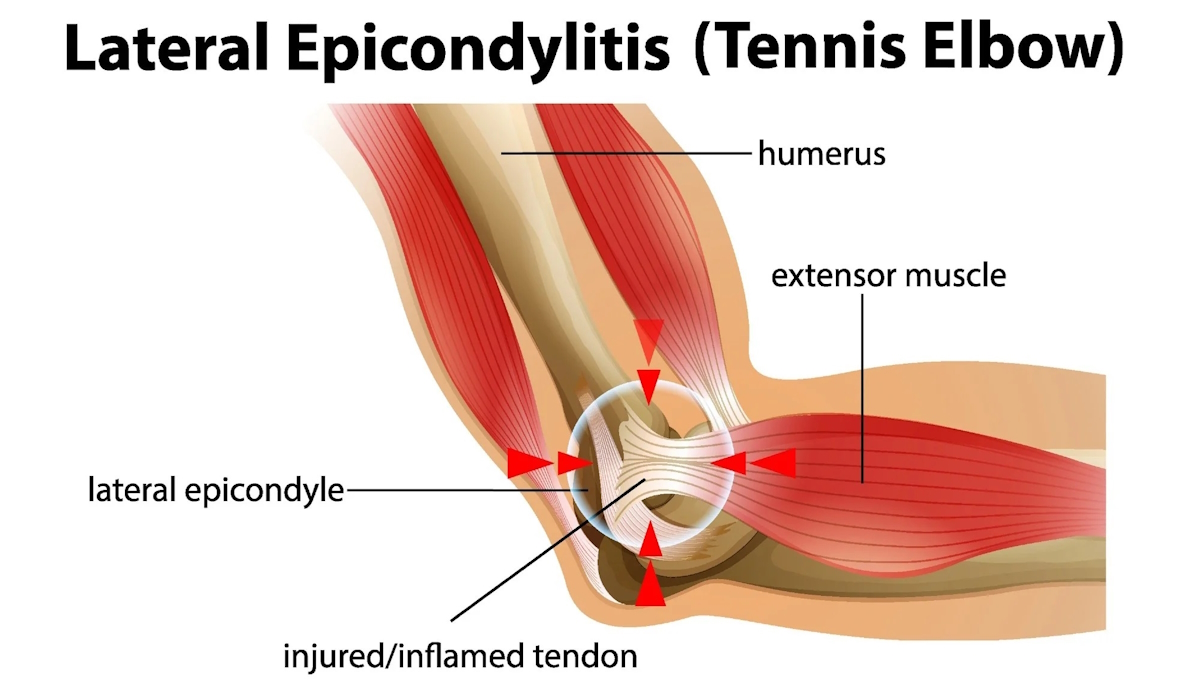- Do These Symptoms of Elbow Tendonitis Sound Familiar?
- Things to Know About Elbow Tendonitis
- Find Relief with Top Fort Worth Orthopedic Surgeons
Mark* knows it’s normal for people to experience occasional elbow pain, especially those who lead an active lifestyle. But lately, Mark’s situation has felt a little different. His elbow has been hurting ever since he got back into the gym and started weightlifting again. And it didn’t help matters that he followed that up with a few rounds of tennis when the weather was nice. The pain has gradually worsened, even as he’s backed off the intensity of his workouts. After finally seeing a doctor, Mark learned that he had elbow tendonitis.
Elbow tendonitis, also known as lateral epicondylitis, tennis elbow, or the less common golfer’s elbow, is an overuse injury marked by excess inflammation caused by repetitive use of the wrist and arm. It is estimated that 1-3% of the adult population each year experiences elbow tendonitis. The good news is that it is very treatable, though the condition can worsen if ignored—limiting your ability to perform daily tasks.
Do These Symptoms of Elbow Tendonitis Sound Familiar?
- Pain or burning on the inner or outer part of the elbow
- Stiffness in the elbow
- Swelling
- Reduced range of motion
- Pain when gripping or lifting an item or when rotating the wrist
- Pain that radiates into the forearm
- General weakness
- Tingling sensations in arm or hand
Even if you received a proper diagnosis for elbow tendonitis, it can be confusing knowing all the ins and outs of the condition and how to go about properly treating it so that you can get back to what you enjoy doing. At Fort Worth Hand Center, our mission is to provide the best care possible and educate you on your condition, what to expect moving forward, and the top treatment methods for your unique situation. No matter the condition, we want to address all your hand and upper extremity questions so that you can make important health decisions.
Things to Know About Elbow Tendonitis
1. Tendonitis is often felt but not always seen
Just because you have elbow tendonitis doesn’t mean you will always see it. On the outside, everything about your elbow and forearm might appear to be fine. In other words, no swelling, redness, or other indications. But beneath the surface, there is inflammation and small tears in the tendons that join the forearm muscles to the bony lump on your elbow.
Since your forearm is largely responsible for the overall stability of your hand, wrist, and fingers, any injury to the site can be extremely painful. On top of that, the pain doesn’t have to be localized to one particular area. It can be the elbow and radiate to the forearm and wrist.

2. Repetitive motions can cause elbow tendonitis
We use our arms all day, every day. But the difference with repetitive motions is that they are performed in excess throughout the course of a single day or during a specific activity, such as a sport or job function (constant gripping, swinging of the arm, rotating motions, etc.). A few repetitive activities that can lead to elbow tendonitis include:
- Playing a musical instrument
- Using scissors
- Gardening
- Computer use
- Cooking
- Cutting tough food
- Sports that involve a lot of throwing (baseball, discus, etc.)
- Playing tennis or golf
- A direct blow to your elbow
- Cutting down trees
- Working on an assembly line
- Home repair projects
- Other manual work
3. Some people may be more susceptible to elbow tendonitis

Elbow tendonitis sufferers can include people like you who do repetitive lifting, turning of the wrist, gripping, or similar movements. Examples might be avid computer users, painters, mechanics, cooks, plumbers, and carpenters. Others include butchers, weightlifters, knitters, construction workers, and video game players.
4. There are treatments that can be done at home
Elbow tendonitis rarely requires surgical intervention. In fact, your doctor will likely ask you to try the following home remedies first to see if your condition improves. It’s important to note that the recovery time for elbow tendonitis can take anywhere from six to 12 months, depending on the severity of your injury.
- Rest from the activities that strain your muscles and tendons
- Consistent use of ice packs to reduce swelling
- Non-steroidal anti-inflammatory drugs (NSAIDs) and painkillers, such as ibuprofen or naproxen
- Topical NSAIDs such as creams and gels
- Physical therapy exercises, chiropractic care, and acupuncture
5. You may be able to prevent elbow tendonitis
Elbow tendonitis may not be completely avoidable, especially if you play a sport or have a job that requires repetitive movements. That said, one of the best ways to limit your risks and avoid putting extra strain on your tendons is to warm up and stretch properly, take ample breaks where possible, use lighter tools or weights, and focus on improved arm mechanics.

Find Relief with Top Fort Worth Orthopedic Surgeons
Elbow tendonitis is a very common condition that almost anyone can experience during their lifetime. The good news is that this condition doesn’t have to keep you from the things you love to do or need to do for work. Elbow tendonitis is treatable, often through conservative means. If necessary, your fort Worth orthopedic surgeon could also recommend surgery if your situation is severe enough. If you want to reclaim your life, take the time to find the right orthopedic surgeon for your unique needs.
From fingertips to elbows, Fort Worth Hand Center offers expert diagnosis of injuries, chronic conditions, and degenerative diseases. If surgery is your best treatment, our orthopedic physicians operate in state-of-the-art, accredited surgery centers. We care about our patients and strive to provide the best care.
To learn more or to schedule an appointment, call 817-877-3277 or complete the form below.
Prior to starting any new treatment or if you have questions regarding a medical condition, always seek the advice of your doctor or other qualified health provider. This information is not a substitute for professional medical advice.
Fort Worth Hand Center serves the DFW area, including North Richland Hills, Pantego, Pelican Bay, Richland Hills, River Oaks, Saginaw, Sansom Park, Southlake, Trophy Club, Watauga, Westlake, Westover Hills, Westworth Village, White Settlement, Arlington, Azle, Bedford, Benbrook, Blue Mound, Burleson, Colleyville, Crowley, Dallas, Dalworthington Gardens, Edgecliff Village, Euless, Everman, Flower Mound, Forest Hill, Fort Worth, Grand Prairie, Grapevine, Haltom City, Haslet, Hurst, Keller, Kennedale, Lakeside, Lake Worth, Mansfield, Newark, and all of North Texas.



